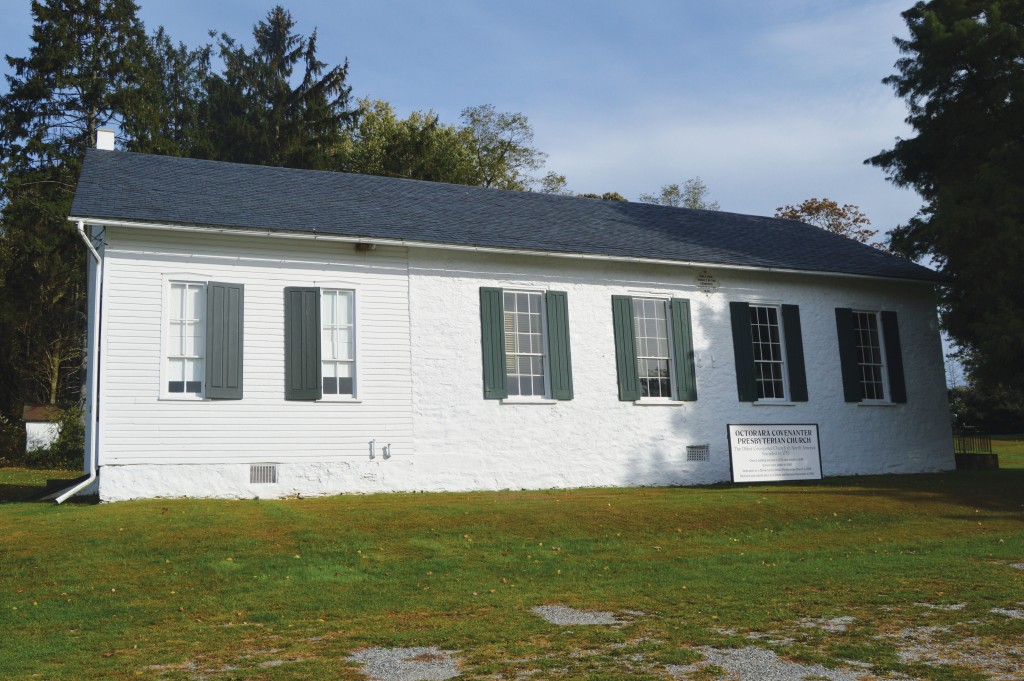You have free articles remaining this month.
Subscribe to the RP Witness for full access to new articles and the complete archives.
Have you ever heard of Rev. John Cuthbertson? He served in all three regions of the Reformed Presbyterian Church that existed in his time—Scotland, Ireland, and America. Most importantly, he was the first Covenanter minister from Britain who came to America permanently.
Cuthbertson was born in Scotland in 1718 to prominent Covenanter parents, who planned his education with a view to his entering the ministry. In his childhood this seemed unlikely, as there was no Reformed Presbytery; only a single minister, John McMillan, was then serving. However, he could still receive training, and after an Associate Presbyterian minister joined the Covenanters, the presbytery was formed, and he was ordained in 1747.
None of the early ministers pastored individual congregations. Because there were small societies all over southern Scotland, they constantly traveled from society to society. After Cuthbertson had done this for three years, presbytery sent him to Ireland to perform a similar service among societies there, as they had no ministers at all. Here he remained for only one year before presbytery gave him a far greater responsibility.
It would seem that Cuthbertson was exceptionally capable and willing to undertake service without the constant aid of other ministers. In the spring of 1751, presbytery voted to send him as a minister to colonial America. He landed in Delaware on Aug. 5. His task? Ministering to societies scattered over half of British North America, from New Hampshire to Virginia, a region many times larger and unimaginably wilder than long-settled southern Scotland and northeastern Ireland.
One American Presbyterian minister, Alexander Craighead of Octorara, Lancaster County, Pa., had publicly accepted Reformed Presbyterian views in 1743. He worked to gather representatives from the many societies of southeastern Pennsylvania into a “General Meeting,” which wrote to the Reformed Presbytery asking for missionaries. However, Craighead returned to the Presbyterian Church in 1749 and moved to Virginia. Consequently, Cuthbertson was forced to minister to all the societies alone.
Because of Craighead’s work, Lancaster County and the surrounding areas of Pennsylvania—then on the colony’s southwestern frontier—were the strongest regions of Covenanterism in British North America. Cuthbertson settled at Octorara and spent the rest of his life preaching in that region. However, his greatest efforts were several missionary tours far longer than those of any previous Covenanter minister.
One of Cuthbertson’s earliest long trips occurred in late 1759. Another Presbyterian minister, Alexander McDowell of Pelham, Mass., had accepted Covenanter principles, and Cuthbertson was interested in working with him. Along the way, he spent several weeks with a society at Coldenham, N.Y.—the basis of the Coldenham-Newburgh congregation, the oldest RPCNA church still in existence—and briefly visited a group at West Hebron, N.Y., much farther north. He then preached at several locations in Connecticut and Massachusetts before reaching Pelham and preaching for nearby societies. McDowell, in turn, visited southeastern Pennsylvania and assisted Cuthbertson on his missionary journeys over the next two years before disappearing entirely, leaving Cuthbertson alone again.
Over the next 15 years, Cuthbertson continued his lonely travels. He made several more visits to Coldenham and West Hebron, periodically visiting groups in New Jersey, Maryland, and Virginia. One of Cuthbertson’s members traveled all the way to Ireland in 1773 to ask for more ministers, and the Irish Presbytery sent two: Matthew Linn and Alexander Dobbin.
This development allowed the Reformed Presbytery to form in 1774. The new men based themselves in Pennsylvania near Cuthbertson, allowing him a more settled existence. However, in 1779, he went west over the mountains to Chartiers and Pittsburgh, in a disputed frontier region claimed by both Pennsylvania and Virginia. This was not yet a strong RP region; the first settlers had arrived just 10 years earlier, and Cuthbertson preached to just 50 people at the core society.
Like the rest of the Covenanters, Cuthbertson adhered to the rebel movement in 1777 and, as the Revolution was concluding, he worked for greater religious cooperation. Covenanters had separated from the Presbyterian Church largely because of church-state relations in Britain. With the American states having won independence from the Crown, the Scottish covenants—all written specifically for a British context—seemed no longer relevant. Consequently, Cuthbertson led the Reformed Presbytery into talks with the Associate Presbytery, which culminated in the two churches merging in 1782 to form the Associate Reformed Presbyterian Church.
Cuthbertson never retired. He continued serving his Octorara congregation until 1783, when he moved to one farther west in Lower Chanceford, Pa. Here he worked until his death at age 75 in 1791. In 39 years’ labors, he baptized nearly 2,000 children, married 240 couples, and rode nearly 70,000 miles, mostly in regions with no roads or bridges.
